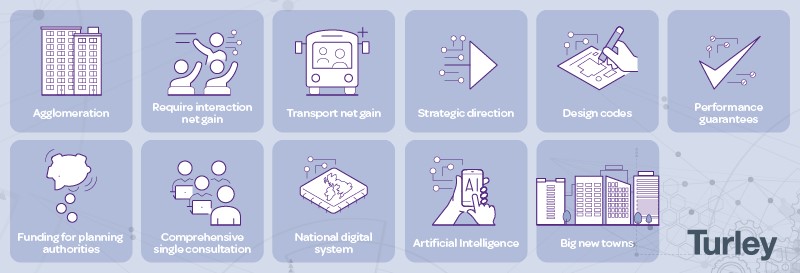Comment
Creating productive places: takeaways from our recent roundtable
In February we brought together key players in the industry, including leading academics, developers, planners and industry body representatives, to consider how the planning and design process can make our towns and cities more productive places.
The crisis in productivity improvement in the UK is well known. Rates of investment, transport infrastructure and education are often cited as causes, but the planning and design of new places is rarely mentioned. At our roundtable in Manchester, we explored the issues and what improvements could be made.
The session was split in two, with the first half focusing on big picture issues around land value capture, the Green Belt and the England and Wales discretionary planning system. The second half looked at what could be done within the existing system, immediately, to let what we build improve productivity.
Fundamental reform – three key areas from the debate
1. The Green Belt
Discussions pointed out that the Green Belt, in certain locations, has created a “doughnut” effect, where people have been forced to move beyond it to find affordable housing, creating longer commutes and more congestion. The release of only a small amount, near transport nodes, could enable a huge amount of productive housing and business development. The impact on productivity was emphasised due to the combination of long commutes and an inability to move due to the impact on house prices.
There was agreement that a more strategic review of the purpose and function of Green Belt for modern times is required. It was pointed out that although the Green Belt isn’t there to provide green space for urbanites, there is a public perception that it is in place for that effect, allowing people access to green space near towns. If Green Belt designation is removed entirely, it was suggested there will be a need for some form of replacement to ensure green space is available, possibly as a new environmental designation or as an extension of a current one.
Despite the strong support for reform, it was agreed the issue is so politically sensitive that it needs to be given to an impartial strategic review and consultation, ideally involving all political parties, to give the reform the impetus required.
2. Land value capture
There have been various official and unofficial attempts to capture the land value increase that is created by planning permission; CIL, S106 and others. Its role in productivity is the ability to ensure there is the social and physical infrastructure for places to function well and that raises the question whether more value must be captured.
The recent Levelling Up Act has brought in an infrastructure levy and the Labour party has proposed changes to the rules around compulsory purchases, to retain the value. There was general support for the principle and the need to capture more value for infrastructure, alongside a sense that current systems aren’t transparent on where the money raised goes. It was also pointed out that the process must not reduce the incentive for landowners to bring forward development; this requires certainty that any structure is for the long-term.
3. The planning system
There was a sense in the room that the current operation of the planning system reduces productivity. Focusing here on fundamental reform, the discussion considered switching the discretionary system operated currently to a zoning or rules based system. The discretionary system was broadly criticised around the table as giving too much power to local politics. There was some support for switching to a rules based system, whereby a local authority would have to set the rules for development in a plan and then developers would be able to build in accordance. Whilst there was support for this position, it was pointed out that these systems work in other countries in differing ways and levels of success; the devil is in the detail.
There are already moves in this direction. The role that Design Codes can play in bringing some of the confidence of a rules based system, within the current system, were noted. The Government has also just introduced National Development Management Policies (NDMPs) in the Levelling Up act. These policies will have statutory status, override local policies and give a structure within which local plans function. This should mean simpler, shorter local plans and greater confidence for developers.
Fundamental reforms summary
What was striking from discussions was the general agreement that reform is necessary. There was debate about the exact mechanisms, but almost complete consensus that the Green Belt needs to be reviewed, land value capture is crucial and planning uncertainty is reducing productivity. It was positive to see some reforms happening that could improve things, such as NDMPs and the infrastructure levy. What was disappointing was the lack of a sense that we would see the fundamental change required, particularly on the Green Belt, despite near consensus. The pessimism was founded on a combination of political timidity, a lack of public trust and an administration/management structure that is struggling to cope with the existing system.
11 immediate opportunities suggested
The group was asked about some immediate opportunities to improve the productivity of new development; that won’t require fundamental reform. Below is a summary of the main ideas captured:

1. Agglomeration – Focus on increasing city centre populations and business to encourage interaction. This would allow higher builds.
2. Require interaction net gain – Have evidence that development will increase the amount of incidental interaction between people.
3. Transport net gain – Require that new development increase the speed with which people and goods can move.
4. Strategic direction - Genuine regional planning gives scale and needs local authorities to work together.
5. Design codes - Proactive setting of these can give confidence to developers and ensure quality for residents.
6. Performance guarantees – Use flexible rates or cash retentions to reward / punish against performance guarantees; traffic speeds, air quality, no. of jobs, etc.
7. Funding for planning authorities - Better funding in return for guaranteed performance in terms of timelines and decisions.
8. Comprehensive single consultation – For planning applications, ensure consultation with consultees is carried out comprehensively once to avoid the determination process slowing due to a sense of shifting sands.
9. National digital system - Implement a simple digital system that holds data on what has been agreed and compare to what is developed. This could be used by the public and developers to improve data quality and reduce research needed for each new scheme.
10. Artificial Intelligence – This is being used to process planning applications quicker. This could reduce issues and much red-tape before they reach human decision makers.
11. Big new towns – Our scale of development is too small to fund major infrastructure like railway stations. Propose big new towns and manage them strategically.
These quick-fire ideas suggested that there was a big opportunity to improve the administration of the current system of planning, making development cheaper and quicker. There was a sense of positivity around how technology and long term stability in thinking could enable better places to be built, faster. Despite that, there was an underlying feeling that that system is trapped in a vicious cycle; struggling to cope with managing the day to day, meaning the improvement that could reduce the burden can’t be made.
Thank you to all our participants for their contributions which made it a hugely enjoyable and worthwhile discussion.
Participants
Harry Knibb – Oxford Properties
David Smith – IM Properties
Graham Winch – The Productivity Institute
Louise Robinson – Vastint
Martin Crookston – Strategic Planning Consultant
Paul Cheshire – LSE Professor Economic Geography
Richard Blyth – RTPI
Antony Pollard – Turley Economics
Barny Evans – Turley Sustainability and ESG
David Diggle – Turley Planning
Jadine Berry – Turley Planning
Jeff Nottage – Turley Design
Rebecca Boston – Turley Planning
Please get in touch with Barny Evans for further information on what was discussed at the event.
To download a PDF summary of the roundtable discussion please click here.
15 April 2024


